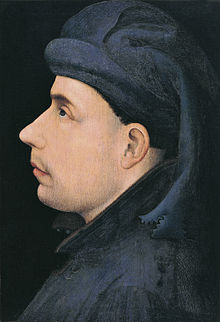Wenceslas I (Luxembourg)
Wenceslas I (born February 25, 1337 in Prague , † December 8, 1383 in Luxembourg ) was the only son from the second marriage of the Bohemian King John of Luxembourg with Beatrix of Bourbon (1305-1383), a cousin of the French king Philip VI. The later Emperor Charles IV is Wenceslas half-brother.
Life
Wenzel's parents Johann and Beatrix were fond of each other with mutual love and appreciation. That is why in 1340 Johann decided to change his will in favor of Wenceslas. Wenzel was to receive the ancestral Luxembourg and the French fiefs.
After Johann's death on August 26, 1346, Wenzel could not take over his inheritance. Due to the financial support that Baldwin von Trier gave to his great-nephew Karl when he was elected king, the Archbishop of Trier administered the county of Luxembourg as a pledge until his death on January 21, 1354.
On March 13, 1354, Wenceslaus became the first Duke of Luxembourg. The new Duchy of Luxembourg was formed from the County of Luxembourg, the County of Durbuy, the County of Laroche, the Margraviate of Arlon and some smaller lordships. The Duchy of Luxembourg remained outside the Bohemian crown, it was a fiefdom of the German kingdom. Wenzel became imperial prince and received the honorary office of the Reichstruchsess.
Since 1352 Wenceslas was married to Johanna von Brabant (1322-1406), heir to the duchies of Brabant and Limburg . Through this marriage, the rivalry between the houses of Luxembourg and Brabant that had existed since the Battle of Worringen (August 26, 1288) was ended. On December 26, 1356, Wenceslaus became Duke of Brabant and Limburg. This enabled the Luxembourgers to neutralize the Wittelsbach power complex in the north-west of the empire ( Holland , Zeeland , Hainaut ). Wenzel resided at the Brussels court and proved to be a promoter of French court culture.
In 1368 Wenceslaus was appointed imperial vicar . In the exercise of this office he was subject to the dispute over escort rights to Duke Wilhelm II of Jülich and was captured with his comrades on August 22, 1371 in the battle of Baesweiler . It was only when Charles IV paid 50,000 guilders for Wenzel's release in the spring of 1372 that the Duke of Jülich released his prisoners. In addition, Wenzel had to do without the imperial vicariate. In the following years the financial burden on the duchies was enormous due to Wenceslas' repayment obligation. Wenzel was unable to continue the successful financial policy of his first years in government. There was socially motivated riots.
As the marriage between Wenceslaus and Johanna remained childless, Charles IV, in the year of his death (1378), had his half-brother, son and designated successor Wenceslaus IV appoint as heir to the duchies of Luxembourg, Brabant and Limburg. The relationship between Duke Wenceslaus and King Wenceslaus IV was not good. Duke Wenzel was pro-French and favored the antipope Clement VII, who resided in Avignon . King Wenceslaus IV approached England and was a supporter of the Roman Pope Urban VI.
After the death of Duke Wenceslaus on December 8, 1383, Wenceslaus IV could only inherit the Duchy of Luxembourg. Wenceslas widow Johanna von Brabant took over the administration of her duchies of Brabant and Limburg. In 1390 Johanna placed her duchies under the protection of the Duke of Burgundy Philip the Bold . Wenceslaus IV was also called to the dispute between the Teutonic Order and Poland on October 8, 1409. His decision then led to the second largest battle in the Middle Ages, the Battle of Tannenberg .
literature
- Jörg K. Hoensch : The Luxembourgers - A late medieval dynasty of pan-European importance 1308–1437. Verlag W. Kohlhammer, Stuttgart 2000, ISBN 3-17-015159-2
- Frantisek Kavka: At the court of Karl IV. Edition Leipzig, 1st edition 1989, ISBN 3-361-00258-3
- Ferdinand Seibt : Karl IV. - An Emperor in Europe 1346 to 1378. Deutscher Taschenbuch Verlag GmbH & Co. KG, Munich 5th edition December 1994, ISBN 3-423-04641-4
Web links
| predecessor | Office | successor |
|---|---|---|
|
Karl I. (Emperor Karl IV.) |
Duke of Luxembourg 1353-1383 |
Wenceslaus II the Lazy |
| personal data | |
|---|---|
| SURNAME | Wenceslaus I. |
| BRIEF DESCRIPTION | Son of Johann von Luxemburg and Beatrix von Bourbon |
| DATE OF BIRTH | February 25, 1337 |
| PLACE OF BIRTH | Prague |
| DATE OF DEATH | December 8, 1383 |
| Place of death | Luxembourg |
